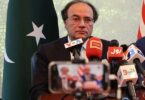China-Pakistan Economic Corridor (CPEC), a flagship project of China’s Belt and Road Initiative, apparently for facilitating global trade, has once again come under scatting criticism by the US admiration senior officials. Addressing a gathering of members of academia and representatives of civil society at AmbWells think tank in Islamabad, Assistant Deputy Secretary of State for South Asia and Central Asian Affairs Alice Wells renewed her criticism of Chinese loans extended to Pakistan for financing CPEC related projects. She alleged the cannon of transparency based on international competitive bidding have not been followed in award of construction contract to ensure it to Chinese companies alone. In prima facie the contention seems convincing if compared with contracts awarding process in Pakistan for the World Bank financed mega development projects.
Ambassador Alice Wells had dwelt on the same theme about likely debt servicing trap in terms of cost-benefit analysis, saying that it is devoid of quid-pro-quo and will benefit China at the expense of Pakistan, while speaking at an event at the Wilson Center in Washington on November 21 last year. She had alleged that transparency had not been observed in contract awarding process of CPEC related projects to exclusively benefit the Chinese construction companies, which would escalate the cost of projects. The media reports of violations of Public Procurement Authority Rules by the previous government had corroborated the stance of top US diplomat. She had argued that that Chinese Companies would import labour and raw material into Pakistan from China by denying employment to local manpower thereby accruing financial losses to Pakistan.
Alice Wells had specifically mentioned the increase in the cost of Peshawar-Karachi main railway line ML-1 project from $6 billion to $9billion. It is pertinent to mention that Railway Minister Sheikh Rashid Ahmad had hinted in his interview with female TV anchor GharidaFarouqi about possible reduction in cost of this project. But the Chinese financiers may have not agreed for downward revision of the cost which was agreed with previous PML-N government. Asian Development Bank representative in Islamabad had expressed reservations about the implication of huge loans to be acquired for this project.
Alice Wells ‘criticism of CPEC loans of $62 billion last year had invited an angry and swift response from Yao Jing, Chinese Ambassador in Islamabad. He had urged the US senior officials to avoid allegations about shady nature of CPEC related projects and challenged to bring out proof it they had any such thing. Likewise, Chinese Foreign Ministry Spokesperson Gang Shuang , in a press briefing, had rejected Alice Wells’ assessment of CPEC debt and described it calculation based on prejudiced thinking. However, the fact remains that capital expenditure agreed with Chinese power companies for certain hydropower project was msantime more than Dasu Hydropower Project Phase-1, which is financed by the World Bank on concessionary loans from 1.5 percent to 2 percent interest. The Chinese project loans carry over 6 percent interest. Likewise, the coal power tariff allowed to Chinese electricity producing companies is 8 cents per unit against the 5 cents charged in other countries of the region.
Pakistan foreign debt sustainability indicators have significantly worsened with external debt shooting up to 159 percent of the total foreign reserves, says Public Debt Management Report released by the Ministry of Finance the other day. The report takes into account public debt up to the closing of last fiscal year when it reached to Rs.32.7 trillion, jacking up debt-to-GDP ratio to 84 percent against the sustainable limit of 60 percent set in the Fiscal Responsibility and Debt Management Act of 2005. With their hands tied by the agreements made by the previous government and its legacy of huge foreign debt, PTI government is compelled to acquire more and more foreign loans. In the first half of current fiscal year foreign loans of $5.5 billion have been obtained. Bulk of these loans shall be spent on retiring foreign debt. It vindicates the worries of well-wishers of Pakistan about its landing into debt trap. But the saying that beggars are no choosers holds good when the ruling political elite yearns for kickbacks in development projects.






